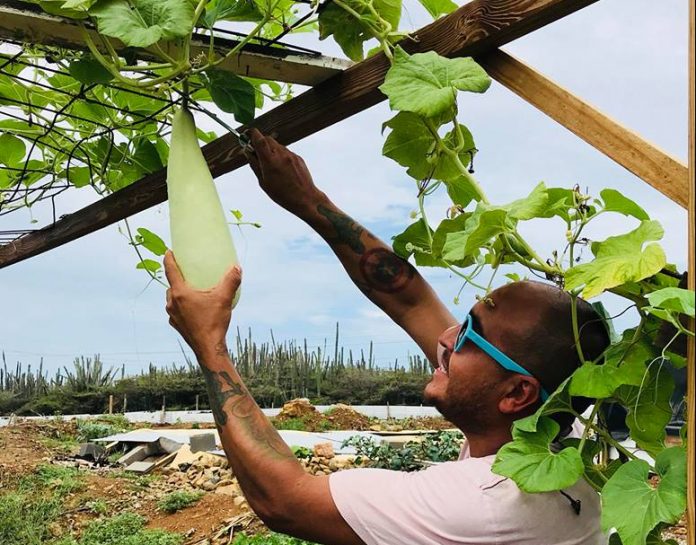‘Sustainable agriculture for healthier locals and rehabilitated drug addicts’
Somewhere uphill in Alto Vista you will find a beautiful piece of land with an old, white, traditional cunucu house on it, dating from 1923. Nothing remarkable about that, you might think, as there are many of these old aunties scattered around the island. But this one has an amazing background story. Aruba Today visited the place on a warm, sticky afternoon where James Ocalia was working on the land with a handful other men.
‘Cas Speransa Nobo’ says the name sign on the cunucu house, it refers to the new hope for the students of the rehabilitation program that is available here. “We call them students rather than drug addicts or clients because they have chosen to learn another life. Their addict life is their past, the goal is to learn and graduate in a new life.” The Aruban Ocalia explains that he runs his company –Goshen, which means ‘inundated land’ – with the help of the men that are part of the rehabilitation program.
“They learn to cultivate local crops and it works in two ways. For them it is a subject they learn and a daily goal in life, for me it is exercising my job and doing something good for my island at the same time.” Recently Goshen Organic Farm was visited by an expert on the field of water production, professor dr. engineer Filomeno A. Marchena (Boei). The farm recycles water already and during the visit Marchena shared some useful information with Ocalia.
Fair Harvest
While we are walking on the land the students enthusiastically show ‘their crops’, inviting Aruba Today’s journalist to taste a comcomber chiquito. The pride they take in their work and their smiling faces are touching and there is definitely something magic about this place. Maybe it is best described as pure: the land, the taste of the vegetables, the drive of the students and the sincerity of James, all together it is ‘Hope’ indeed. On the 7.000 m2 land only local crops are grown: comcomber chiquito (cucumber), jambo (okra), boonchi (beans), pika (hot peppers) form the main production. But one can also find patia (watermelon) and dragon fruit as well as moringa. The plants are seeded and grown in the nursery, built by the students, and when strong enough being transferred to the land.
How it Began
Aruba is a nation of hopeful individuals, who want the best for their island. It is a fact that the social challenges facing our island affect us all in one way or another.
Whether it is child abuse or neglect, domestic violence, life-controlling addictions, the high rate of high-school drop outs, increasing poverty, etc. etc., when one is affected, we are all affected. While HopeAruba Movement understands that it is the role of government to be the primary catalyst in providing the framework, platform and financing for addressing these social challenges, they also understand that the government is not necessarily the only agent to heal these issues. Understanding both our responsibility and privilege as citizens, whether individual or corporate, to play an active part in creating the future we want to see, is critical if we are to heal our nation, they state.
We must understand the severe consequences of the long-term mismanagement of Public Finances and how this affects us all, directly or indirectly. Government financial aid for social organizations has dropped by more than 50% in the past years. So what are we to do? A group of citizens decided…we will start by taking responsibility! This prompted the birth of HopeAruba Movement’s first Social Impact Business, Goshen Sustainable Development Corporation VBA and HopeAruba’s first Social Impact Vehicle under the HopeAruba Fundacion Restauracion banner Cas Speransa Nobo.
“We developed the Goshen Smoothie and we started to develop an Agri-Tourism niche “Farm to Table” experience, a unique experience for our visitors …a true “taste of Aruba”. Now open: Goshen Villas – A Bed & Breakfast concept and Momentous Café at Goshen at Alto Vista 52, as we grow our business to provide entrepreneurial solutions to social challenges. And of course, Goshen’s main purpose is to support vehicles for social change as we engage in business with a purpose, we can be an instrument for national transformation!”
Make a difference
To make a difference is where both connect. “I myself want to make a difference for my island with my passion: sustainable agriculture.
My goal is that locals include the typical Aruban veggies in their food system and eat healthier.” He has a thing for Aruba’s traditional vegetables and fruits, since he was a kid. “I wrote a book, ‘My favorite Curacaos and Aruban Dishes’, and found myself asking my granny how actually to prepare traditional dishes with local veggies. That is not right, we need to implement them into modern cooking to preserve these treasures of culture. Italians may have their zucchini and tomatoes, Aruba has her comcomber chiquito and jambo.
Our generation does not know how to cook our own veggies, we are often keen on preparing meals from the Italian or other foreign gastronomy, but what about our own culture?” His story creates a curiosity towards the real taste of local gastronomy. “In my opinion three ingredients are necessary to develop social enterprise: the social aspect, the environmental aspect and support by economic pillars, in Aruba’s case tourism.”
If you wish to visit Goshen Sustainable Development/Cas Speransa Nobo and buy some local vegetables, you are welcome TODAY at Alto Vista 52 between 10 am and 12.30 pm. Facebook: Goshen Sustainable Development Corporation VBA.
Get your fresh organic veggies straight from our farm to your table! Choose from: Comcomber chikito, Boonchi, Yambo, Pure honey with comb and Watermelon. While you’re there, try their refreshing Goshen Smoothie, also available in frozen packages to prepare at home.

















